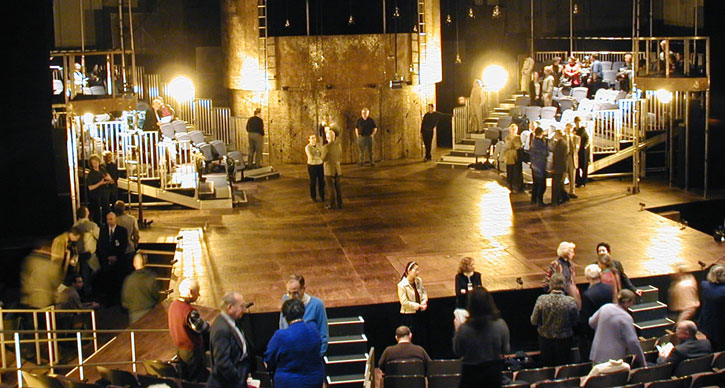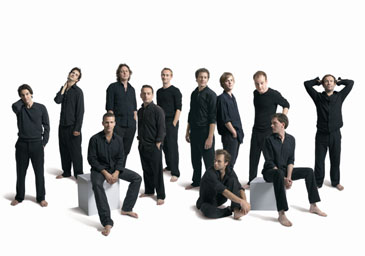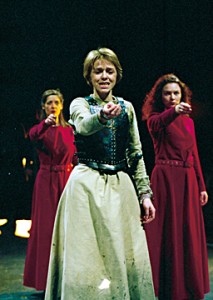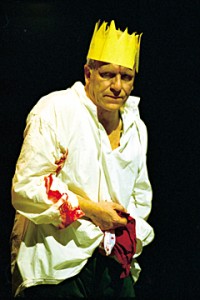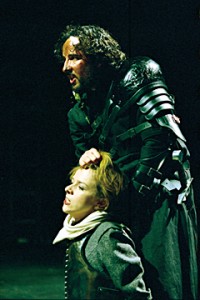People Are Talking: Royal Shakespeare Company Live in HD: Shakespeare’s Henry V

Tell us what you thought! This is the place to comment on the performance and talk to other people about what you saw and heard. What will you remember about the performance one year from now?
Don’t forget to click the option to be notified when new comments are posted. For more information, review our community conversation guidelines.
For more behind the scenes photos, follow us on Facebook, Twitter, and Instagram.
People Are Talking: National Theatre Live: Shakespeare’s Hamlet

Tell us what you thought! This is the place to comment on the performance and talk to other people about what you saw and heard. What will you remember about the performance one year from now?
Don’t forget to click the option to be notified when new comments are posted. For more information, review our community conversation guidelines.
For more behind the scenes photos, follow us on Facebook, Twitter, and Instagram.
People Are Talking: Royal Shakespeare Company Live in HD: Shakespeare’s Othello

Tell us what you thought! This is the place to comment on the performance and talk to other people about what you saw and heard. What will you remember about the performance one year from now?
Don’t forget to click the option to be notified when new comments are posted. For more information, review our community conversation guidelines.
For more behind the scenes photos, follow us on Facebook, Twitter, and Instagram.
RSC Creative Residency in Ann Arbor
Photo: On stage during the RSC residency in March, 2001. More of our photos with the RSC here.
Next week, the Royal Shakespeare Company will visit Ann Arbor for its 2012 creative residency (March 10-20, 2012).
During three previous residencies presented by UMS, the RSC performed four history plays (“Henry VI, parts i, ii, and iii” and “Richard III” in 2001), a world premiere stage adaptation of Salman Rushdie’s “Midnight’s Children,” (alongside Shakespeare’s “Coriolanus” and “The Merry Wives of Windsor,” 2003) and “Antony and Cleopatra” and “The Tempest” starring Patrick Stewart (alongside “Julius Caesar” in 2006).
This residency, similar to one in 2010 which led to the production of three new plays, is a working residency and a collaboration with U-M, during which a creative team of six actors, two directors, voice and movement coaches, and the RSC’s dramaturg join actors from the New York-based LAByrinth Theater Company to focus on the development of two plays it hopes to produce during upcoming seasons: Pushkin’s “Boris Godunov” (directed by RSC artistic director Michael Boyd) and “The Orphan of Zhao,” the first Chinese play produced in Europe (directed by chief associate director Gregory Doran).
Creative Residency 2012 Public Events
Admission is free, though seating may be limited.
Tuesday, March 13, 5 pm
James Fenton Reading
Kalamazoo Room at the Michigan League
Friday, March 16, 4 pm
“The Orphan of Zhao” Presentation
Blau Auditorium, Ross School of Business
Saturday, March 17
9 am — “Word and Action: An Acting Master Class” with Gregory Doran
4 pm — “Bringing ‘Creative Project 2012’ to the Stage: The Audience and the Director” featuring Gregory Doran, RSC Chief Associate Director
Blau Auditorium, Ross School of Business
Sunday, March 18, 4 pm
“Drama in Translation” (a roundtable discussion) and “A Conversation with Michael Boyd, RSC Artistic Director, and Ralph Williams”
Blau Auditorium, Ross School of Business
Monday, March 19, 4:30 pm
Reading of “Boris Godunov”
Blau Auditorium, Ross School of Business
Have you attended RSC events in the past? Share your experiences below.
What’s next for Propeller?
We were sitting in the Power Center late yesterday afternoon, watching the changeover from Richard III to Comedy of Errors, and Caro MacKay, executive producer of Propeller, was talking about the shift from Richard’s stark black/white and blood-red world to the trash-strewn, gaily lit, exuberant world of Comedy. “We’re putting some color in the set now,” she said, as stagehands hoisted a panel of graffiti-sprayed shingling onto the big rock ’n roll truss that frames both productions.
MacKay said the idea behind Propeller’s environment for Comedy is “what we call ‘British lager louts.’ A Costa del Sol vacation, where Brits wear silly hats and spend the day drinking lager and hanging around the beach.” She chuckled. “Costa del Ephesus!”
This afternoon was your last chance to visit—at least in Ann Arbor. (The company will do a six-week run at Boston University’s Huntington Theater later this spring.)
A few behind-the-scenes tidbits:
· It’s not a stretch to think of the chorus members as hooligans—soccer fans (witness the jerseys) whooping it up far from home.
· The setting itself is a piazza in the 1980s, a period “quite close to us and probably the height of all this silliness,” MacKay said.
· Designer Michael Pavelka came up with the design of the graffiti himself, then hired a crew of real graffiti artists to render it. But before they agreed to lift a spray can, they made Pavelka swear it was his own design—it’s part of their code of honor not to copy another graffiti artist’s work.
MacKay talked briefly about what’s ahead for Propeller after its international tour of Richard III and Comedy of Errors winds up in August. While here in A2, Propeller received the welcome news that it had received three years’ funding from the British Arts Council—“which means we’re good for four more years,” MacKay said. “We can breathe.” (The news was bittersweet, though, as it came coupled with the announcement that 206 other British arts organizations had received no funding. Many would be forced to close.)
Propeller will reconvene in September and start work on next year’s touring shows, still to be determined. “There’s always one play Ed wants to do,” MacKay said of director Edward Hall. “He struggles a bit to find the other.”
Once they’ve picked the shows, Hall and Pavelka will come up with a set that works for both and begin rehearsals. The 14 members of the current company will get first-refusal rights for the next troupe. It’s a key part of the way this most democratic of theater companies works.
Sometime in the future, Hall wants to do his own cycle of the Shakespeare history plays—the three Henry VIs, Henry V, and Richard III. The working title is Blood Line. MacKay says they’re not sure when they’ll do it, “but we’re working toward it.”
A2 audiences who reveled in the RSC’s first residency here back in 2001—which gave us the three Henry VIs and Richard III—may find this news as tantalizing as I do. UMS, are you listening?
Caro MacKay, Producer for Propeller, Shows Some Love for Ann Arbor Audiences
Later this week Caro MacKay, executive producer of Propeller, will zip into Ann Arbor to see her company in action, but over the weekend she was at home in London, where I reached her by phone. The former Royal Shakespeare Company producer knows us well—she was here for both the first and second RSC Ann Arbor residencies, in 2001 and 2003. I asked her why she wanted to bring Propeller here…
CM: Having done two seasons at Ann Arbor, I know your enthusiasm. But you’re also a tremendously thoughtful audience, and you’re obviously in a university town, so there’s great intelligence there, and I just thought you’d really like this company. Propeller offers something different—it’s very immediate and physical theater, but it’s also very intelligent Shakespeare.
You even decided to premiere Richard III here.
CM: Yes, it’s premiering in Ann Arbor. That’s really exciting for me. I’m thrilled that we’ll be presenting both shows [Richard III and The Comedy of Errors] because you will see the measure of what the company is capable of. And the different actors—they’ll be doing something in one show and something utterly different in the other show.
What was it about Propeller that made you want to get involved with the company?
First, their love of the text. It is there in all the shows. The text is very true to Shakespeare’s text. The second thing is, for me, every really, really, really good director is a great storyteller. And I think the way that [Propeller director] Ed Hall tells the actual story is terrific. That’s what leapt out at me. It’s the clarity—the actual clarity of the story, so that you can follow it. And the energy. Propeller is enormously physical.
Tell me about the ensemble. They’re onstage the whole time, for both shows, which is so intriguing.
It’s very particular to Ed’s work. And it means everybody is in rehearsal all the time. They’re in there all the time, all the day. You’re never only called for the scenes that you’re in. Rather than having just a half a dozen people working lines in rehearsal room, you’ve got 14. Everybody is always concentrated. I just think it is a true ensemble—everybody is looking at the scene that is the play and asking what is that scene doing for the play? What is the story line behind it?
It’s an all-male ensemble. How’d a woman like you wind up being the producer?
It’s quite funny, isn’t it? A girl to be running an all-male Shakespeare company. It took me a little while for me to really go, yes, I believe in this. But after a couple of shows, I got the clue. What you find with just having one sex is that actually you’re listening to the words. Whether you’re a male or a female, you’re just listening to what Shakespeare is saying and asking, what does that mean? That’s what it allows you to do—to scrape away the sexual politics and just listen to the words.
Propeller: Q&A with UMS Programming Director Michael Kondziolka
All week long guest blogger Leslie Stainton will be following the Propeller theater company residency in Ann Arbor. She starts the week with a Q&A with UMS Programming Director Michael Kondziolka about how he learned about Propeller.
For years, Michael Kondziolka, UMS’s Programming Director, has been my go-to guy for all things cultural. If Michael says see it (as he does about Propeller), I move heaven and earth to heed the call. So I asked him how Propeller caught his eye…
MK: Through the RSC—the gift that keeps on giving. Caro MacKay, one of the RSC producers I worked with 10 years ago on the Henry VI/Richard III tetralogy here in Ann Arbor, brought to my attention the work of Propeller and Ed Hall in general. Ed Hall is the son of the British director Sir Peter Hall—and Caro said, “I think he’s doing important work. You owe it to yourself to see it.” So I checked it out and was blown away by the sort of arch, vaguely edgy sensibility. At the same time, they had a lot of integrity and respect for the text. This wasn’t about trashing Shakespeare—it was about bringing a young, fresh, edgy sensibility to the text. I remember leaving the theater and going to King’s Cross Station to get my sleeper car up to Edinburgh for the festival there. I’d planned to sleep on the way up, but we stayed up all night and talked about the production.
How does Propeller fit into the broader UMS vision for theater—and for Shakespeare in particular?
MK: Over the long term we want to celebrate the work of companies like the RSC and the Globe Theatre, but we also want to start painting a picture of the versatility and the broadness of Shakespeare, and of just how wonderfully elastic these texts are. It’s one thing to understand that intellectually, and it’s another thing to actually witness it. Well, this company will help people with that!
How different will the Propeller experience be from, say, the RSC?
MK: I’m not so sure it’s going to differ that much. I think that ultimately what people are going to respond to and recognize is the absolute craft, the absolute training that’s in evidence, and more so than almost anything, this wildly profound commitment to ensemble. For people who don’t go to the theater every day, there’s something so special about the mystery and magic of a truly trained ensemble working together over an extended period of time.
So in a nutshell, what’s Ed Hall’s take on Shakespeare?
MK: I would imagine that that’s what’s going on in Ed Hall’s mind is, how do you take this potentially strangling tradition—especially in the UK—how do you take the weight, the smothering weight of this tradition, and keep it alive? And keep it relevant and exciting and engaging and fresh? I think that’s one of the questions he’s trying to answer. I can imagine really great things for a company like Propeller in Ann Arbor—great audience reaction, a real recognition of the power, strength, integrity, and impact of this company’s work, and how that could build over time. I don’t want to make any predictions, but I have a feeling.
This Day in UMS History: Royal Shakespeare Company History Plays (March 10-18, 2001)
Ten years ago today, UMS audiences began a great experiment — the Royal Shakespeare Company presenting four Shakespeare History plays (Henry VI, parts i, ii, and iii, and Richard III) over the course of 27 hours with lunch and dinner breaks built in. The productions, directed by now-RSC artistic director Michael Boyd, marked the beginning of a long relationship between the University of Michigan and Ann Arbor with the RSC. Over the past decade, this partnership has included three major residencies, as well as workshopping new plays on the U-M campus. Each residency was accompanied by dozens of free educational events for students and the public-at-large.
Those who were present will no doubt fondly recall some of these images from the productions:
The three Henry VI plays were presented at 11 am, 2 pm, and 8 pm on a Saturday, with audiences returning on Sunday for the climactic production of Richard III. (There was also one mid-week cycle, which ran Tuesday, Wednesday [both matinee and evening], and Thursday.) Since that season, UMS’s theater programming has expanded significantly, with an annual commitment to presenting both live and high-definition broadcasts of international theater — including this season’s productions of Richard III and The Comedy of Errors by another British theater company, Propeller. Like the RSC, Propeller presents contemporary interpretations of Shakespeare and works with an ensemble cast; unlike the RSC, Propeller uses an all-male cast to present the Bard’s works, as would have been the case in Shakespeare’s day.
Richard III opens at the Power Center on Wednesday, March 30, and The Comedy of Errors opens the following evening. Tickets can be purchased at www.ums.org or by calling 734-764-2538.


